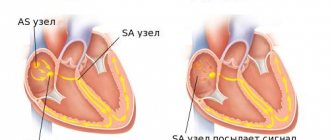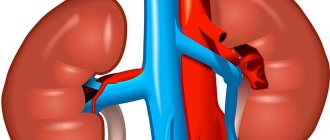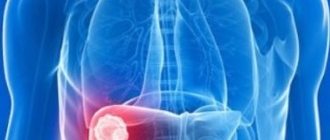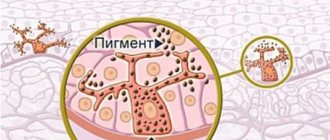Persistent increased secretion or administration of thyroid hormones leads to a state of thyrotoxicosis.
Excess production of biologically active substances of the thyroid gland can be a consequence of a number of diseases. The causes of thyrotoxicosis can also be physiological. For example, during pregnancy the level of thyroid hormones can be significantly higher than normal.
In the population, 0.5–1.3% of all people suffer from thyrotoxicosis. Severe forms of the disease are quite rare. If hormonal levels are not corrected, the patient may develop severe complications.
If thyreostatic therapy is started on time, the prognosis for life and ability to work is good.
Mechanism of development of thyrotoxicosis
Hyperthyroidism syndrome can have different pathogenesis.
Causes of development of thyrotoxicosis:
- high function of thyrocytes (formation of excess hormones);
- secretion of hormones outside the thyroid tissue;
- destruction of gland tissue (temporary increase in hormones in the blood);
- introduction of synthetic hormones.
High function of thyrocytes is most often observed in primary thyrotoxicosis. The entire thyroid tissue or its local areas (toxic nodes) may be damaged. Most often, this form of thyrotoxicosis is caused by diffuse toxic goiter (Graves' disease, Graves' disease), multinodular and mixed goiter, toxic adenoma, and iodine overdose.
Secretion of thyroid hormones outside the thyroid tissue is possible in the ovaries and in actively functioning metastases of thyroid cancer.
The destruction of thyrocytes leads to a sharp release of colloid rich in hormones into the blood. This situation occurs when:
- subacute thyroiditis;
- painless thyroiditis;
- postpartum thyroiditis;
- iodine-induced thyroiditis type 2.
Thyrotoxicosis is transient in nature. Goes away without treatment. Due to the destruction of thyroid cells, hypothyroidism can form over time.
Drug-induced thyrotoxicosis is either the erroneous prescription of excessive doses of synthetic thyroxine or self-medication . Sometimes patients take hormones to simulate an endocrine disease.
Symptoms of thyrotoxicosis
The clinical picture of any disease with an excess concentration of thyroid hormones has characteristic features.
Regardless of the cause of thyrotoxicosis, the following is observed:
- acceleration of metabolism;
- tachycardia;
- arterial hypertension;
- weight loss;
- nervousness;
- sudden mood changes;
- increased sweating;
- low-grade fever;
- muscle weakness;
- diarrhea;
- shortness of breath at rest and during exercise.
Thyrotoxicosis in children is manifested by accelerated growth and rapid ossification of skeletal bones.
Symptoms
Manifestations of thyrotoxicosis in women are observed in various organs and systems. The eyes react sensitively to the overproduction of hormones by the thyroid gland. They become bulging, red, and watery. The risk of developing conjunctivitis and keratitis increases due to the fact that the patient rarely blinks. The eyeball protrudes forward, the palpebral fissure widens (exophthalmos).
READ ALSO: What is a colloid goiter of the thyroid gland and how to get rid of a large accumulation of colloids in the follicles of an important organ
CNS disorders:
- hot temper;
- high excitability;
- increased feeling of anxiety;
- emotional imbalance.
You may notice that with thyrotoxicosis a woman fusses all the time, is in a hurry, and makes a lot of unnecessary movements. Often there is trembling in the hands. Patients sleep little and cannot fall asleep for a long time. Because of this, a feeling of chronic fatigue appears.
Changes in the cardiovascular system:
- arterial hypertension;
- atrial fibrillation or sinus tachycardia.
With subclinical thyrotoxicosis, an increase in upper pressure and a decrease in diastolic pressure are often observed. Irregular heart rhythm can cause heart failure.
Impact on the gastrointestinal tract:
- disturbance of intestinal motility;
- change in appetite;
- stomach ache;
- vomit.
Due to the fact that food does not have time to be properly digested and the body does not receive the required amount of nutrients, the woman begins to rapidly lose weight. Accelerating metabolism requires greater energy expenditure to maintain vital functions. Due to improper digestion of food, the body does not receive enough energy. As a result, cachexia can occur - very severe exhaustion. Due to a lack of nutrients, muscle tissue is also affected, and thyroid myopathy develops.
A long-term excess of thyroid hormones causes sexual dysfunction in a woman:
- menstrual irregularities;
- infertility;
- decreased libido.
During menstruation, headaches, dizziness, and nausea often occur.
Other symptoms of thyroid thyrotoxicosis:
- increased sweating;
- low-grade fever;
- fragility and hair loss;
- strong thirst;
- increased blood sugar;
- respiratory dysfunction.
If there are formations in the thyroid area, the neck may become thickened. This may be a sign of the presence of nodes and neoplasms. Tumors can metastasize to the trachea, larynx, and esophagus, impairing swallowing function and causing loss of voice.
Specific symptoms of diseases
To make an accurate diagnosis, the endocrinologist evaluates the combination of symptoms of thyrotoxicosis.
Specific signs of diffuse toxic goiter are obvious endocrine ophthalmopathy, diffuse increase in the volume of the thyroid gland, characteristic complications (atrial fibrillation, adrenal insufficiency, increased blood sugar, osteopenia).
Subacute thyroiditis is associated with infectious and inflammatory symptoms. The patient experiences pain in the neck, discomfort in the throat, malaise, and fever. Analyzes reveal an increase in the erythrocyte sedimentation rate (several times).
Thyrotoxicosis in chronic autoimmune thyroiditis is characterized by a mild course. Cardiac medications and sedatives are sufficient for therapy. No pronounced loss of body weight and severe heart rhythm disturbances were recorded.
Diagnosis of the disease
Diagnosis of thyrotoxicosis begins with a conversation, medical history, and evaluation of complaints.
Signs of thyrotoxicosis during examination:
- skin changes (wet, hot);
- tremor of the hands and trembling of the whole body;
- eye symptoms;
- swelling of the legs (myxedema);
- vascular murmur over the gland tissue;
- enlarged spleen;
- enlarged and painful liver;
- gynecomastia in men;
- mastopathy in women;
- heart rhythm disturbances and hypertension.
An important point is feeling (palpation) of the thyroid tissue. Normally, the size of the lobes practically does not exceed the size of the phalanx of the patient’s thumb. In addition, during palpation a neoplasm (nodule) in the thyroid tissue can be detected. The picture of diffuse toxic goiter is especially characterized by an increase in the volume of the isthmus between the lobes of the gland.
Diagnosis confirmation
A preliminary diagnosis of thyrotoxicosis requires mandatory laboratory confirmation. The patient donates blood for hormones, antibodies and other tests.
The main marker of excess functional activity of the thyroid gland is the pituitary hormone (thyroid-stimulating hormone, TSH). In thyrotoxicosis, this indicator is always suppressed. Diffuse toxic goiter is characterized by such a low TSH value that its level cannot be determined by the laboratory.
Free thyroxine (T4) increases with manifest thyrotoxicosis. A normal level of this hormone with a reduced TSH indicates a subclinical (initial) stage of the disease. The success of treatment is monitored by the dynamics of T4 levels.
Free triiodothyronine (T3) can be greatly increased in toxic nodes. During thyrotoxicosis, the normal ratio of T4 and T3 (4:1) changes. In old age, there may be an increase in T3 without an increase in T4. This condition is especially dangerous for the cardiovascular system.
Antibodies control:
- antibodies to thyroid peroxidase;
- antibodies to the TSH receptor;
- antibodies to thyroglobulin.
The detection of antibodies to thyroid peroxidase confirms chronic thyroiditis, and antibodies to TSH confirm diffuse toxic goiter.
Antibodies to thyroglobulin are monitored after radical surgery on the thyroid gland.
In addition to laboratory tests, the patient undergoes ultrasound diagnostics . The volume, structure, blood supply of thyroid tissue and the presence of focal formations in it are assessed.
If a patient has a pronounced heterogeneity of thyroid tissue on ultrasound, then a diagnosis of autoimmune thyroiditis is likely. With diffuse toxic goiter, an increase in the volume of the gland and an increase in its blood supply are recorded. Toxic adenoma and multinodular goiter are characterized by the presence of a lesion against the background of normal thyroid tissue.
Additionally, a study of gland cells - cytology - may be required. To take tissue for analysis, a targeted puncture biopsy is performed during obvious thyrotoxicosis; this study is contraindicated, as there is a risk of complications (thyrotoxic crisis).
In some cases, to clarify the nature of the pathological process, radiopharmacological scanning is prescribed. The ability of the gland to capture and remove iodine is assessed.
During the scan, excessive activity of the entire tissue, “hot” and “cold” nodes, and metastases of thyroid cancer can be detected.
Stress as one of the main causes in women and men
Although the role of stress is not recognized as the main cause of hyperthyroidism, it can trigger a chain of reactions in particularly sensitive people. A stressful situation can be a provoking factor of the disease against the background of:
- hereditary predisposition;
- susceptibility to autoimmune diseases;
- disturbances in the functioning of other endocrine organs;
- iodine deficiency.
This is explained by the fact that in response to emotional shock, the formation of adrenaline, norepinephrine, and cortisol increases. These hormones, in turn, activate the pituitary gland and the thyroid gland itself.
The second way that hyperthyroidism can develop is through immune disorders due to stress. A decrease in the formation of antibodies and infection with viral infections lead to the appearance of autoimmune inflammation of the gland with increased production of hormones.
The sympathetic nervous system, through which stress hormones exert their influence on the body, has receptors on the vessels that supply the thyroid gland. Under the influence of its impulses, the structure of proteins on the cell membrane changes, and the flow of T4 and T3 into the blood is activated.
Medical tactics
All patients with thyrotoxicosis are recommended to have a calm daily routine, a balanced diet for thyrotoxicosis, and limiting emotional stress.
The diet for thyrotoxicosis should contain enough calories, animal and plant proteins, vitamins and microelements. All sweets and fructose products are limited.
For severe thyrotoxicosis, medications are prescribed. Such treatment can be effective for increased thyroid function of any nature. A good effect is achieved with diffuse toxic goiter. In 30% of cases, conservative therapy is sufficient for complete cure.
For toxic nodes, medications provide only a temporary improvement in well-being. After stopping the pills, relapse of thyrotoxicosis is almost inevitable.
Treatment of toxic focal formations and many forms of diffuse toxic goiter must be radical. Surgery or treatment with radioactive iodine can completely remove active thyroid tissue.
Thyrotoxicosis in children is treated in the same way as in adults.
Treatment
Treatment of thyrotoxicosis, the development of which always occurs due to increased production of thyroid hormones by the thyroid gland, involves the use of various approaches. It is possible to cure this pathology forever, but first the doctor must make sure that the human body is strong enough for the chosen method of treatment, and it will not lead to complications.
All treatment prescriptions are made based on diagnostic results, taking into account the person’s condition. It is important to consider the presence of other chronic diseases. For successful treatment, it is necessary to provide general strengthening measures, monitor your diet and follow the rules of a healthy lifestyle.
Today there are three main methods used:
- Conservative;
- Surgical;
- Treatment with radioactive iodine.
The conservative technique involves the use of thyreostatic medications that suppress the activity of the thyroid gland. During the treatment process, it is important to use prescribed medications in a timely manner and regularly visit an endocrinologist. In the initial stages of the disease, tyrosol is considered an effective drug. It can only be used after a doctor's prescription. It is important to remember that this medicine is not safe. If it is overdosed or used incorrectly, it can cause harm to health.
The surgical method involves cutting off part of the thyroid gland. This method is indicated for the development of a large nodule in the thyroid tissue, which leads to increased production of hormones. Of course, the decision to perform surgery is always made when the presence of a malignant tumor is confirmed.
The use of radioactive iodine to eliminate hormonal imbalance is considered a very effective and affordable method. The treatment process involves a single oral administration of a special capsule containing radioactive iodine. The treatment procedure with radioactive iodine is based on the fact that this element is absorbed exclusively by thyroid cells. Over the course of about a week, radiation destroys some of the thyroid cells, which are replaced by connective tissue. This accordingly leads to a decrease in hormone production. The procedure for using radioactive iodine leads to irreversible changes in the thyroid gland, so this treatment can be compared in its effect to surgery. The danger of this method is that it can lead to hypothyroidism, and, consequently, to the need for replacement therapy after such treatment throughout life.
Relapses after proper conservative treatment are rare. As a rule, they happen only in case of non-compliance with the doctor’s prescriptions and recommendations. But if relapses recur, then surgery is recommended.











